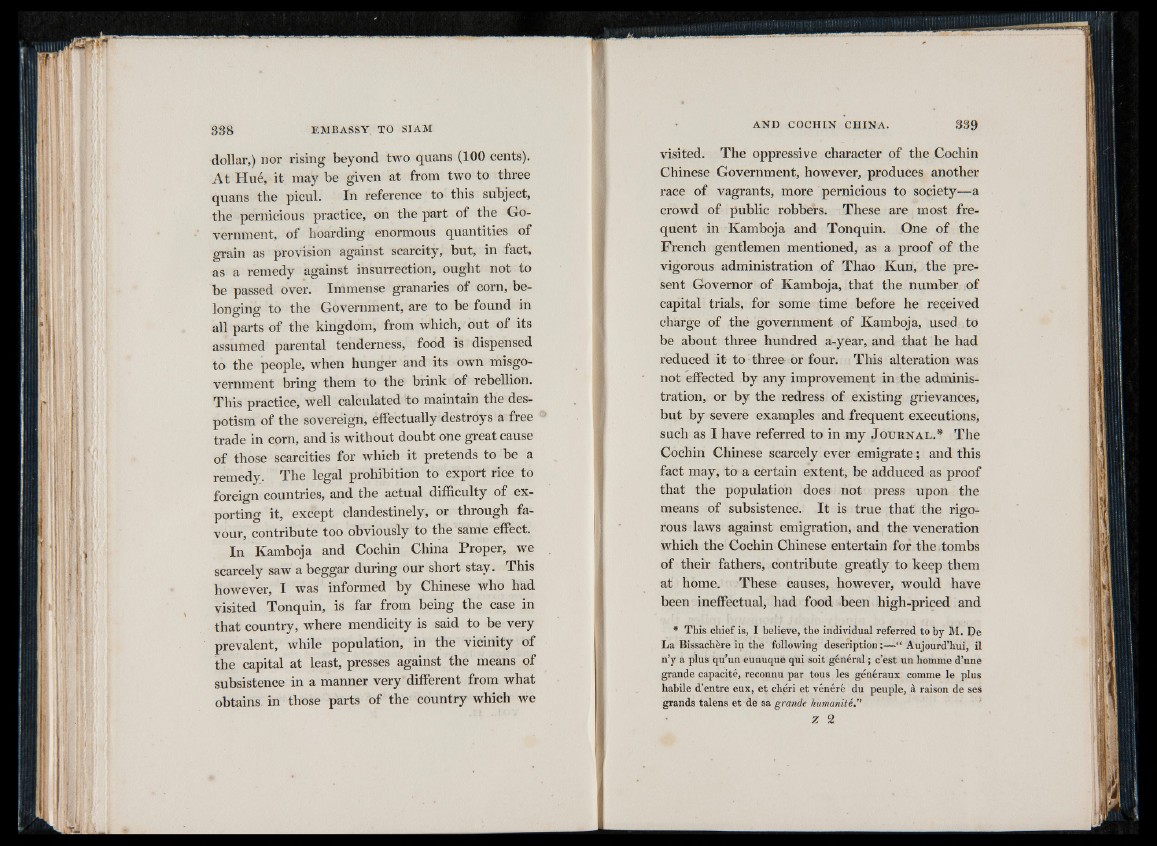
dollar,) nor rising beyond two quans (100 cents).
A t Hué, it may be given at from two to three
quans the picul. In reference to this subject,
the pernicious practice, on the part of the Government,
of hoarding enormous quantities of
grain as provision against scarcity, but, in fact,
as a remedy against insurrection, ought not to
be passed over. Immense granaries of corn, belonging
to the Government, are to be found in
all parts of the kingdom, from which, out of its
assumed parental tenderness, food is dispensed
to the people, when hunger and its own misgo-
vernment bring them to the brink of rebellion.
This practice, well calculated to maintain the despotism
of the sovereign, effectually destroys a free
trade in corn, and is without doubt one great cause
of those scarcities for which it pretends to be a
remedy. The legal prohibition to export rice to
foreign countries, and the actual difficulty of exporting
it, except clandestinely, or through favour,
contribute too obviously to the same effect.
In Kamboja and Cochin China Proper, we
scarcely saw a beggar during our short stay. This
however, I was informed by Chinese who had
visited Tonquin, is far from being the case in
that country, where mendicity is said to be very
prevalent, while population, in the vicinity of
the capital at least, presses against the means of
subsistence in a manner very different from what
obtains in those parts of the country which we
visited. The oppressive character of the Cochin
Chinese Government, however, produces another
race of vagrants, more pernicious to society—a
crowd of public robbers. These are most frequent
in Kamboja and Tonquin. One of the
French gentlemen mentioned, as a proof of the
vigorous administration of Thao Kun, the present
Governor of Kamboja, that the number of
capital trials, for some time before he received
charge of the government of Kamboja, used to
be about three hundred a-year, and that he had
reduced it to three or four. This alteration was
not effected by any improvement in the administration,
or by the redress of existing grievances,
but by severe examples and frequent executions,
such as I have referred to in my J o u r n a l .* The
Cochin Chinese scarcely ever emigrate ; and this
fact may, to a certain extent, be adduced as proof
that the population does not press upon the
means of subsistence. I t is true that the rigo orous
laws against emigration, and the veneration
which the Cochin Chinese entertain for the tombs
of their fathers, contribute greatly to keep them
at home. These causes, however, would have
been ineffectual, had food been high-priced and
* This chief is, I believe, the individual referred to by M. De
La Bissachère in the following description ;—“ Aujourd’hui, il
n’y a plus qu’un eunuque qui soit général ; c’est un homme d’une
grande capacité, reconnu par tous les généraux comme le plus
habile d’entre eux, et chéri et vénéré du peuple, à raison de ses
grands talens et de sa grande humanité.’'
z 2